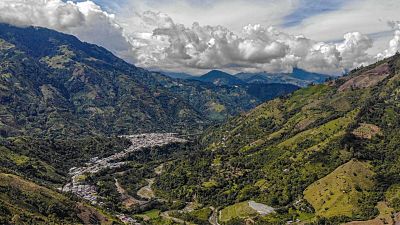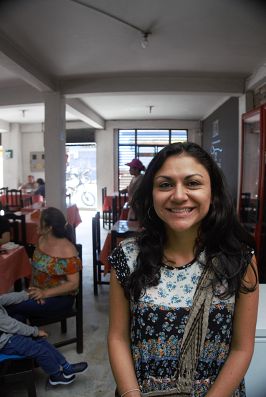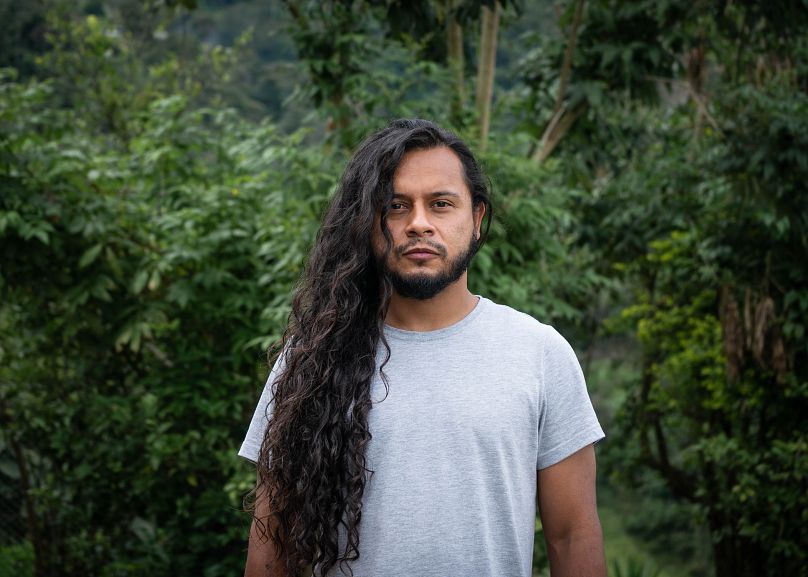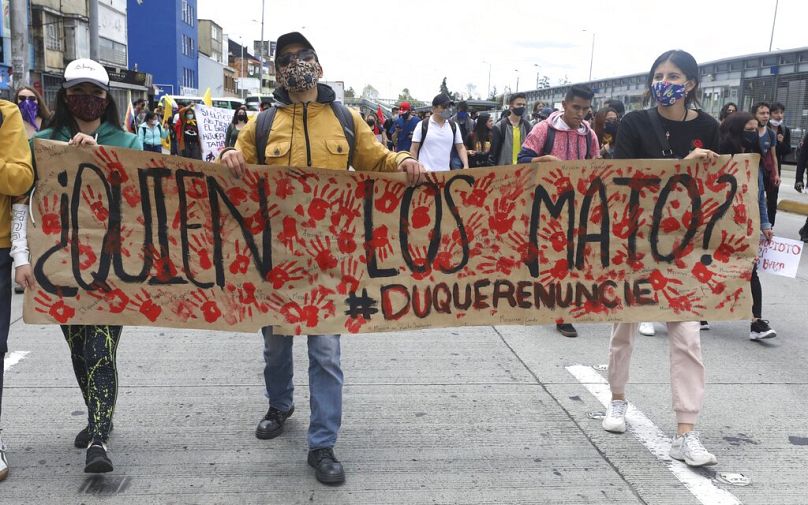
The beautiful Cajamarca region in Colombia that local communities are fighting to protect. - Copyright CAFOD
By Louise Eldridge • Updated: 08/12/2021
Almost five years ago, small-scale farmers in Colombia won a remarkable victory in the fight to protect their land and territories. They voted en masse against international mining company AngloGold Ashanti’s plans to mine gold in the mountainous Andes district of Cajamarca.
This David vs. Goliath action was to protect an environmentally unique area, stop mining developments in the territory and inspire a surge of activism to defend land from predatory economic interests.
But the people of Cajamarca are now once again under threat.
Economic tensions underpinning the 2021 protests
2021 saw a wave of mass protests by Colombia’s working-class and rural communities under a so-called “general strike” – which led to subsequent violent attacks on protestors by security forces.

Viviana Tacha, an activist and lawyer from Colombia’s capital, Bogotá.
CAFOD
“The protests that we have witnessed in Colombia since 2019, with greater intensity in 2021, have their origin in the dissatisfaction of urban and rural communities in the face of growing inequality, linked to mining and agro-industrial business interests,” explains Viviana Tacha, an activist and lawyer from Colombia’s capital, Bogotá.
“The economic interests that exist in the territories due to their extractive potential, that only bring profit to corporations and the country’s political and economic elites, are related to the delicate financial situation that the country is experiencing. This is evident in the impoverishment of the people, who today demand basic rights to work, health, education and a fair tax system."
For the past six years, most recently with human rights organisation, Centro Socio-Jurídico para la Defensa Territorial Siembra – supported by the charity CAFOD – Viviana has been working to protect Colombia’s people and the environment from exploitation.
Including supporting the resistance of Campesinos (small-scale farmers) against plans to extract gold from their territory.
What is ecocide? Why a Glasgow river has fewer rights than a €14 company
“The protests that we have witnessed in Colombia since 2019, with greater intensity in 2021, have their origin in the dissatisfaction of urban and rural communities in the face of growing inequality, linked to mining and agro-industrial business interests,” explains Viviana Tacha, an activist and lawyer from Colombia’s capital, Bogotá.
“The economic interests that exist in the territories due to their extractive potential, that only bring profit to corporations and the country’s political and economic elites, are related to the delicate financial situation that the country is experiencing. This is evident in the impoverishment of the people, who today demand basic rights to work, health, education and a fair tax system."
For the past six years, most recently with human rights organisation, Centro Socio-Jurídico para la Defensa Territorial Siembra – supported by the charity CAFOD – Viviana has been working to protect Colombia’s people and the environment from exploitation.
Including supporting the resistance of Campesinos (small-scale farmers) against plans to extract gold from their territory.
What is ecocide? Why a Glasgow river has fewer rights than a €14 company
Extractive industries drive land grabs and violence
The exploitation of Colombia’s land and communities for the extraction of precious minerals, primarily gold, formed the basis of European colonisers’ economy. Mineral wealth travelled to Europe, while indigenous people were dispossessed of their land, attacked, and killed.
Now, this vicious exploitation continues under a different guise. Collusion between state officials, corporate actors and even armed groups has helped facilitate the capture of minerals, metals and energy sources in Colombia by multinational corporations.
Massacres, torture and forced disappearances continue en masse.
The Peace Accord signed between the State and FARC guerrilla group in 2016 brought hope of an end to the violence Colombia has suffered for years. But despite this, massacres, torture and forced disappearances continue en masse. This is partly explained by the business interests seeking profit from Colombia’s natural resources, which is driving attacks on indigenous, campesino and afro-descendant communities.
The COVID-19 pandemic is exacerbating these developments. As CAFOD’s new report reveals, governments like Colombia’s are increasingly prioritising investment in the extractive industries as a driver for economic recovery, despite the negative ramifications for communities, who are suffering the deep impacts of the pandemic to their health and livelihoods.
Cajamarca’s 'true gold'
In 2017, South African-based multinational corporation, AngloGold Ashanti, who are listed on the London Stock Exchange, announced the discovery of a massive gold deposit in Cajamarca, which they intended to mine. This was the largest gold discovery in Colombia at the time. They named the deposit ‘La Colosa’ (The Colossus).
The project could have substantial negative environmental repercussions, particularly on the area’s paramos – an ecosystem of high-altitude wetlands in the Andes. The paramos are a vital water source, protect innumerable plant and animal species, and function as soil-based carbon storage – crucial protection against climate change.
Cajamarca is known as the agricultural pantry of Colombia. The fertile volcanic soils support a wide range of crops, and the area is famous for its production of arracacha, a famous Andean parsnip, which supplies national restaurant chain Crepes and Waffles. This, farmers say, is Cajamarca’s “true gold”.

Robinson Mejía, a local activist who works with Viviana.
CAFOD
More than half of Cajamarca’s 20,000 inhabitants live off the land as peasant farmers. The project risks destroying the identity of these Campesinos, whose lives are intrinsically bound up in their land and the circular agricultural system that sustains them and other Colombians.
“Here, people are proud and very happy that what is on their plate at lunchtime was grown on each of their farms,” explains Robinson Mejía, a local activist who works with Viviana.
“Their relationship with the land is characterised by how the food is produced.”
Resistance and victory
Campesino organisations, young peoples’ organisations and national environmental groups have tirelessly campaigned against mining projects in Colombia for many years.
In March 2017, despite attempts by Anglo-Gold Ashanti to stop the vote, an overwhelming 98 per cent of the population voted to protect water sources and reject the mine – and the company was forced to suspend its operations in Cajamarca.
This was the first-ever time citizens themselves had called a 'consulta popular' (popular consultation). The company had shown a disregard for the community’s decision to proceed with the mine.
They referred to Cajamarca as an unconquerable territory: no one can enter here.
Viviana believes the case is uniquely important: not only because of the ground-breaking way local community signatures triggered a consulta popular but also because it is very deeply rooted in the local campesino identity and spirit of resistance. This once prevented Spanish colonists from making their capital in the territory centuries ago.
“They referred to Cajamarca as an unconquerable territory: no one can enter here. So, if one considers the campesino attachment to the territory and the love they have for their trade, then it is not surprising that if a mining project comes along that directly threatens that, the people react and respond.”
UN ‘guilty’ of failing to act on climate change say activists and experts from the Global South
More than half of Cajamarca’s 20,000 inhabitants live off the land as peasant farmers. The project risks destroying the identity of these Campesinos, whose lives are intrinsically bound up in their land and the circular agricultural system that sustains them and other Colombians.
“Here, people are proud and very happy that what is on their plate at lunchtime was grown on each of their farms,” explains Robinson Mejía, a local activist who works with Viviana.
“Their relationship with the land is characterised by how the food is produced.”
Resistance and victory
Campesino organisations, young peoples’ organisations and national environmental groups have tirelessly campaigned against mining projects in Colombia for many years.
In March 2017, despite attempts by Anglo-Gold Ashanti to stop the vote, an overwhelming 98 per cent of the population voted to protect water sources and reject the mine – and the company was forced to suspend its operations in Cajamarca.
This was the first-ever time citizens themselves had called a 'consulta popular' (popular consultation). The company had shown a disregard for the community’s decision to proceed with the mine.
They referred to Cajamarca as an unconquerable territory: no one can enter here.
Viviana believes the case is uniquely important: not only because of the ground-breaking way local community signatures triggered a consulta popular but also because it is very deeply rooted in the local campesino identity and spirit of resistance. This once prevented Spanish colonists from making their capital in the territory centuries ago.
“They referred to Cajamarca as an unconquerable territory: no one can enter here. So, if one considers the campesino attachment to the territory and the love they have for their trade, then it is not surprising that if a mining project comes along that directly threatens that, the people react and respond.”
UN ‘guilty’ of failing to act on climate change say activists and experts from the Global South
Under threat again
Despite the overwhelming rejection of mining activities by the people, and a legally binding agreement to have no mining on this territory, there have been some worrying recent developments. In 2017 more than 68 per cent of the Cajamarca territory had mining concessions. As of September, that figure is closer to 30 per cent, but there are also five new applications under consideration.
The new applications were submitted by unknown companies, but Colombian organisations have found indications of possible links between one of these companies and AngloGold Ashanti itself.

Rather than a national dispute between guerrillas and the state, violence in rural Colombia is now marked by local feuds over drug routes, illegal mines and gasoline smuggling
Fernando Vergara/Copyright 2020 The Associated Press. All rights reserved.
The news brings the renewed threats of violence and attacks to environmental defenders protecting their lands. Since 2013, five local campaigners against the mine have been killed, and no one is held accountable for their murders.
The consulta popular mechanism itself is under threat as Colombian courts, pressured by the government and businesses, have moved to prevent other communities from following in Cajamarca’s footsteps – barring mining activities being forced to undergo public consultations.
The news brings the renewed threats of violence and attacks to environmental defenders protecting their lands. Since 2013, five local campaigners against the mine have been killed, and no one is held accountable for their murders.
The consulta popular mechanism itself is under threat as Colombian courts, pressured by the government and businesses, have moved to prevent other communities from following in Cajamarca’s footsteps – barring mining activities being forced to undergo public consultations.
International rules for companies
Many campaigners argue that the Colombian state must stop criminalising and persecuting Colombia’s people – and instead, protect them from the economic interests intent on exploiting their land, water and forests. However, they also acknowledge that many of the drivers are businesses outside the country, who source materials or products from Colombia and profit from human rights violations committed out of sight.
A number of countries, like the UK, have signed up to the United Nations Guiding Principles on Business and Human Rights. This 2011 global framework is meant to ensure that companies do not violate human rights in their operations or supply chains. But it has been done without ever putting in place any laws to hold companies accountable.
CAFOD is calling for a new law to make UK companies prevent abuse – no matter where they operate. With a new law on human rights and environmental due diligence due to be tabled in 2022 by the EU, strong action by the UK could set a precedent and encourage other governments to follow.
If the mine goes ahead, the inhabitants of Cajamarca will sacrifice their lives and land for the benefit of the company and those who buy this gold.Viviana TachaActivist and lawyer from Colombia’s capital, Bogotá.
“If the La Colosa mining project goes ahead, it is a defeat for democracy in Colombia, as well as meaning the end of the life project of a community that has spent generations building its territory around the Campesino economy, guaranteeing our food sovereignty," says Viviana.
"If the mine goes ahead, the inhabitants of Cajamarca will sacrifice their lives and land for the benefit of the company and those who buy this gold. Binding regulations that hold companies accountable for the abuses they commit are essential to stop this."
“In Tolima people defend these mountains with joy, with love, but above all with a lot of enthusiasm,” adds Robinson.
“We do not want to be martyrs – we want to continue to be happy where we live.”
Louise Eldridge is the Lead Policy Analyst - Private Sector at CAFOD.
Additional sources • CAFOD
No comments:
Post a Comment